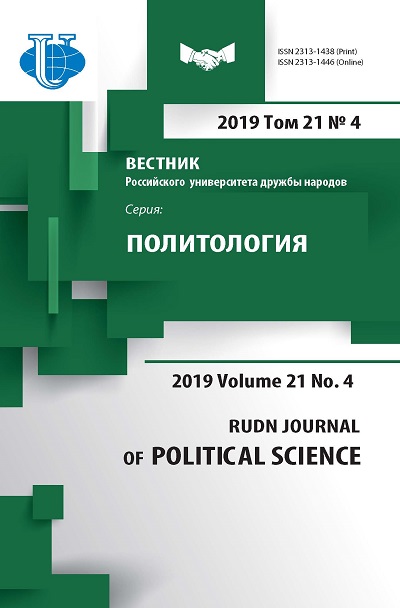Methodological Approaches to Studying the Personality of a Politician-Populist
- Authors: Aybazova M.M.1
-
Affiliations:
- Lomonosov Moscow State University
- Issue: Vol 21, No 4 (2019)
- Pages: 765-776
- Section: RIGHT-WING POPULISM IN THE USA AND EUROPE: ORIGINS AND MODERNITY
- URL: https://journals.rudn.ru/political-science/article/view/22633
- DOI: https://doi.org/10.22363/2313-1438-2019-21-4-765-776
Cite item
Full Text
Abstract
The article discusses the main methodological approaches to studying the personality of a politician of the populist type. The author conducts a brief survey of domestic and foreign experience in using methodologies and methods for drawing up personal psychological portraits of political figures. The choice of theoretical and methodological tools, research methods and conceptual framework plays a special role in the process of studying a politician’s personality. To create a psychologically and ethically appropriate portrait, the author reflects on the dominant behavioral characteristics of a politician, as well as their less pronounced personality traits.
Keywords
About the authors
Madina M. Aybazova
Lomonosov Moscow State University
Author for correspondence.
Email: aib.m@mail.ru
PhD Student of the Department of Sociology and Political Psychology, Lomonosov Moscow State University
GSP-1, Leninskie Gory, Moscow, Russian Federation, 119991References
- Populism: How Europe Accepts the Challenge. Friedrich Ebert Stiftung. Available from: library.fes.de/pdf-files/bueros/ukraine/13025.pdf. Accessed: 13.06.2019 (In Russ.).
- Deiwiks C. Populism. Living Reviews in Democracy. 2009. Available from: ethz.ch/content/dam/ethz/special-interest/gess/cis/cis-dam/CIS_DAM_2015/WorkingPapers/ Living_Reviews_Democracy/Deiwiks.PDF. Accessed: 27.03.2019.
- Baranov N.A. The Revival of Populism: European Experience and Russian Practices. Vestnik of Saint Petersburg University, 2015; 6 (3): 25– 36 (In Russ.).
- Deegan-Krause K., Haughton T. Toward a more Useful Conceptualization of Populism: Types and Degrees of Populist Appeals in the Case of Slovakia. Politics & Policy. Georgia: Georgia Political Science Association. 2009; 37 (4): 821–841.
- Rakityansky N.M., Kolesnichenko Y.V. The Capabilities of the Russian Philosophicalpsychological School and a Methodology for Portraiture of a Politician’s Personality. Vestnik of Moscow University. Political science, 2014; 6: 7–30 (In Russ.).
- Rakityansky N.M. Politician’s Personality: Theory and Methodology of Psychological Profiling. 2nd edition, revised and enlarged. Moscow: Moscow University Press; 2011. 264 p. (In Russ.).
- The Oxford Handbook of Political Psychology Second Edition. Ed. by L. Huddy, D.O. Sears, J.S. Levy. Oxford University Press; 2013. 1008 p.
- Greenstein F.I. Can the Personality Be Studied Systematically? Personality. Culture. Society. 2008; 2 (41): 69–89 (In Russ.).
- Greenstein F.I. Personality and Politics. Psychology and Psychoanalysis of Power. Ed. by D.Ya. Raigorodskii. Samara: Bakhrakh-M; 1999: 169–189 (In Russ.).
- Yuriev A.I. The Potential of the Russian Philosophical-psychological School in the Area of Methodological Problems of Political Psychology. Vestnik of Moscow University. Political Science. 2015; 3: 98–115 (In Russ.).
- Sandole D. Peacebuilding. Oxford: Polity Press; 2011: 574–583.
- Rogovin M.S. Introduction to Psychology. Moscow: High school; 1969. 384 p. (In Russ.).
- Konstantinov V.V. Methodological Foundations of Psychology. Saint Petersburg: Piter; 2010. 240 p. (In Russ.).
- Rubinshtein S.L. Basis of General Psychology. Saint Petersburg: Piter; 2017. 720 p. (In Russ.).
- Asmolov A.G. Personality Psychology. Basic Principles of a Psychological Analysis. Moscow: Academy; 2002. 416 p. (In Russ.).
- Psychological Science in Russia of the 20th Century: Problems of Theory and History. Ed. by A.V. Brushlinskogo. Moscow: Institute of Psychology of RAS; 1997. 576 p. (In Russ.).
- Dodonov B.I. Harmonious Development and Typological Personality Traits. Compilation of Educational Psychology. Ed. by A.I. Krasilo, A.P. Novgorodtseva. Moscow: International Pedagogical Academy; 1995: 168–181 (In Russ.).
- Handbook of Political Psychology. Ed. by J. Knutson. San Francisco: Jossey-Bass Publishers; 1973. 568 p.
- Political Psychology. Ed. by A. Derkach, V. Zhukova, L. Lapteva. Moscow: Urait; 2017. 591 p. (In Russ.).
- Klyuchevskii V.O. Complete Works. Moscow: Myisl; 1987; 1. 439 p. (In Russ.).
- Egorova E.V. The Personal Factor in US Foreign Policy in the 60-90s. Abstract of thesis for the degree of Doctor of Political Sciences. Moscow; 1992. 58 p. (In Russ.).
- Chizh V.F. The Psychology of the Villain, the Ruler, Fanatic. Moscow: Republic; 2001. 416 p. (In Russ.).
- Allport G. Personality: The Problem of Science or Art? Personality Psychology. Texts. Moscow: Moscow University; 1982: 208– 215 (In Russ.).
- Freud S., Bullitt W.T. Woodrow Wilson: A Psychological Study. Moscow: Kanon+ROOI “Reabilitation”; 1992. 288 p. (In Russ.).
- Winter D.G. Assessing Leaders’ Personalities: A Historical Survey of Academic Research Studies. The Psychological Assessment of Political Leaders: With Profiles of Saddam Hussein and Bill Clinton. Ed. by Post J.M. University of Michigan Press; 2003. 476 p.
- Lasswell H. Psychopathology and Politics. Moscow: RAPS; 2005. 352 p. (In Russ.).
- Erikson E. Identity: Youth and Crisis. Moscow: Progress; 1996. 344 p. (In Russ.).
- Egorova-Gantman E.V., Kretov B.C., Vlasov I.E., Frolov I.V. Psychological Portrait of a Politician in the System of Monitoring Political Conflicts – Aspects of Formalization. Scientific and technical information. 1995; 2: 4–13 (In Russ.).
- Anastasi A. Differential Psychology: Individual and Group Differences in Behavior. Moscow: April Publish; EKSMO-Press; 2001. 752 p. (In Russ.).
- Cattell R.B. The Description of Personality: Basic Traits Resolved into Clusters. Abnormality and Social Psychology. 1943; 38: 476–506.
- Eysenck H. Dimensions of Personality: 16, 5, or 3? Foreign Psychology. 1993; 1 (2): 9-23 (In Russ.).
- Norman W.T. Toward an Adequate Taxonomy of Personality Attributes: Replicated Factors Structure in Peer Nomination Personality Ratings. Journal of Abnormal and Social Psychology. UM: University of Michigan; 1963; 66: 574–583.
- Rakityansky N.M. Seventeen Moments of Democracy. Russia's Leaders through the Eyes of a Political Psychologist. Moscow: Stolnyi Grad; 2001. 175 p. (In Russ.).
- Political psychology. Ed. by E.B. Shestopal. Moscow: Aspect Press, 2018. 448 p. (In Russ.).
- Sobchik L.N. Introduction to Individuality Psychology. Moscow: IPP-ISP; 2000. 512 p. (In Russ.).
- The Modern Elite of Russia: Political and Psychological Analysis. Ed. By E.B. Shestopal, A.V. Selezneva. Moscow: ARGAMAK-MEDIA; 2015. 448 p. (In Russ.).
- Bogomolova N.N., Stefanenko T.G. Content Analysis. Moscow: Moscow University Press; 1992. 60 p. (In Russ.).
- Pisarev D.I. Historical Sketches. Moscow: Pravda; 1989. 608 p. (In Russ.).
















